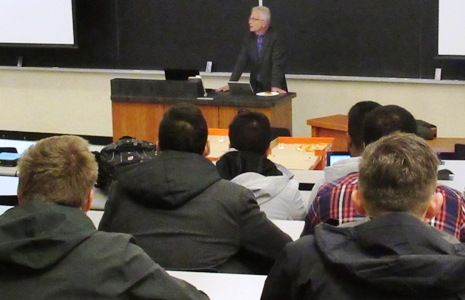
Queen’s Law will play an important role in making recommendations to the Law Society of Ontario (LSO) as it seeks input on the future of its Lawyer Licensing Program. The school’s Faculty Board has appointed Professor Arthur Cockfield, Law’93, to chair an ad hoc committee of faculty and students to assess the LSO review.
“The committee is there to make sure that the LSO hears a broad array of voices before it makes its decision,” Cockfield says. “In this case, it’s the students who have the greatest interest in various outcomes. The committee will be driven by student consensus, and how they feel these issues should be addressed.”
Cockfield is uncertain as to which outcome the LSO is most likely to adopt following its consultations. This makes the feedback of Queen’s Law students essential for the committee as it compiles recommendations to the LSO on changing the experiential component of its articling program. Under the LSO’s current model, lawyers can become licensed by obtaining experience in one of two ways: articling or the Law Practice Program (LPP). In recent years, the number of law graduates in Ontario has outnumbered the province’s available articling positions. Though the LPP was conceived in 2012 to help address this problem, it faces its own set of challenges including a lower student placement rate and an influx of unpaid positions.
On behalf of the Law Students’ Society (LSS), President Lucy Sun, Law’19, seeks to solicit the opinions of students on ways to fix the problem. She hopes to gain student feedback on the number and distribution of available articling positions, LSO program oversight, the cost of the LPP, and placement success.
“The LSO consultations could significantly change both law school and legal practice,” says Sun. “Since statistics suggest that not every law graduate will find an articling position, we must contemplate changes with these students in mind. No student should feel like she or he has to accept an unpaid articling position or be subject to discriminatory hiring practices. The LSO doesn’t sufficiently monitor or consider these issues, and it’s time to change that.”
The Law Society is considering four options.
The first option would see the LSO retain the current model, with continuous adjustments. Another option would enhance the existing system by introducing audits, overseeing program consistency, and requiring that students be paid the statutory minimum wage. A third alternative would be examination-based, eliminating the experiential requirement altogether. The fourth option would require all students to undergo the LPP in lieu of articling.
Sun believes students should reflect on each of these options in terms of the different experiences they offer, and what that will mean over the long-term for lawyers in Ontario.
She recommends that students ask themselves four questions. “What does it mean to be a lawyer? What is the value of practical experience, and what are the best conditions in which to gain that experience? What are the opportunities for legal innovation, and which licensing option will best foster that environment?
“Whether the Ontario licensing process affects us directly or not, it is important to consider what it means to be a lawyer because the answer will change the legal landscape even as we’re practising in it,” she says.
As part of the consultation process, Queen’s Law and the LSS jointly hosted an October 1 visit by LSO bencher Peter Wardle, Law’84, who gave a talk titled “Should We Get Rid of Articling?” During his talk, Wardle sought student feedback on the proposed options and answered their questions.
The Queen’s Law committee will report the results of its consultation, at the next Faculty Board meeting on October 19.
By Justin Murphy
Watch the video of LSO bencher Peter Wardle’s talk “Should We Get Rid of Articling?”